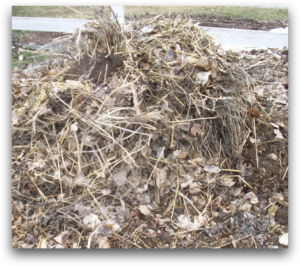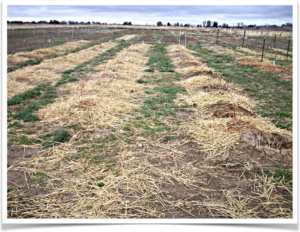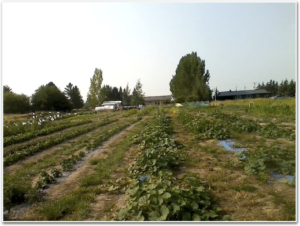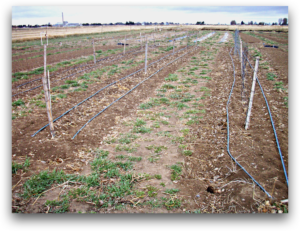Here are a few photos that illustrate the sustainability and conservation measures we are employing on our farm to ensure it is productive for years to come, and to provide our customers with the freshest, tastiest, and safest locally grown produce.
1. Composting. We use all our kitchen vegetable and fruit food scraps (not meats or dairy products) in our compost pile. We use leaves, grass clippings, and dead plants from the farm to feed the pile carbon. We turn it every so often and use the compost as we plant and as a side dressing.

2. Mulching. You can see that around the plants and down the planted rows we use lots of natural mulching, including grass clippings, straw, leaves, and plastic mulching materials to heat the soil. This helps keep the weeds down, conserves water for the plants, and helps with erosion control.

3. Plastic Mulch: You will notice in the above photo to the back area there are plastic mulch strips. This is where we plant things like tomatoes, peppers, melons, etc. The plastic mulch helps warm the soil, protect the plants, conserves water, and keeps down weeds.

4. Drip Irrigation. All of the farm production of produce (fruits and vegetables) is under drip irrigation, with the exception of our orchard and pasture, which is flood irrigated. Drip irrigation is very efficient and delivers water only around the plants, helps prevent plant diseases, and minimizes weeds by not watering non-producing land areas.

5. Crop Selection: We are experimenting with many crops and varieties to push the envelope and see what produces well on our farm in relation to cold tolerance, pest and diesease resistance, and production output.
6. Organic Fertilizer: We incorporate (till in) aged cattle manure to fertilize most of our garden. There are a few crops (berries) where we use commercial fertilizer.
7. IPM (Integrated Pest Management): Sometimes chemical solutions are needed, but before we go there, we do everything else we can against weeds, damaging insects, and plant disease. We do a lot of hand hoeing/weeding. We spray herbicides only on the worst weed offenders (bindweed or morning glory and thistles for example) and where we have bad infestations–and we only use organic herbicides. We rarely if ever use pesticides on the plants, and when necessary, we use organic approved sprays, like Bt or neem oil, to ward off bugs and fungus.